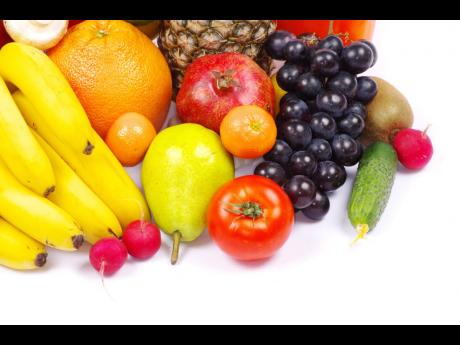Nigel Clarke | Clearing air on removal of GCT from imported raw foods
Among the many issues that attracted attention in the 2024/25 Budget Debate is the proposal for GCT to be removed from imported raw foods, in keeping with Jamaica’s legal obligations, as a signatory to the General Agreement on Tariffs and Trade (GATT), which was replaced by the World Trade Organisation (WTO) of which Jamaica is a member.
EVOLUTION OF GCT
For the 21 years between 1991, when GCT was first introduced, and 2012, the GCT regime for raw foods did not differentiate between domestically produced and foreign sourced raw foods. Both categories of raw foods were excluded from the GCT net.
In 2012, Jamaica needed to raise a lot of revenue. The Portia Simpson Miller-led administration therefore levied a tax package on May 24, 2012, to be effective June 1, 2012, which was designed to raise $19 billion for the 2012/13 fiscal year, which, on an annualised 12-month basis, was a $23-billion tax package representing 1.8 per cent of GDP.
Included in that tax package was a broadening of the GCT base to include the application of GCT to raw foods, excluding chicken. There was some protest on aspects of the measure. On June 6, 2012, the then Government tabled revised revenue measures that, among other changes, amended the application of GCT to raw foods by providing an exemption for domestic raw foods with a few exceptions listed in the Third Schedule of the GCT Act.
So, though this imbalance ended up enhancing protection, the imbalance was motivated by, and first emerged as a result of, the need for additional revenue.
With the benefit of hindsight, from the inception of this imbalance in 2012, it was a crystal clear, black and white, violation of Article III of the GATT which requires that “internal taxes … should not be applied to imported domestic products so as to afford protection to domestic production”. GCT is an internal tax and Article III of the GATT is a very clear rule, to which Jamaica is bound.
Concerns were raised from within the CARICOM region, and the then finance minister, Dr Peter Phillips, introduced an amendment in 2014 to “regularise” the non-application of GCT to raw foods of CARICOM origin.
However, since that time, this issue has long been overshadowed by other priorities. In November 2023, during a review of Jamaica’s regime by a visiting WTO delegation, this violation of Jamaica’s international obligations was observed and brought to the fore.
HONOUR INTERNATIONAL OBLIGATIONS
The simple answer is that Jamaica is compelled to honour its international obligations.
Some have offered a view similar to that expressed in The Gleaner editorial of Saturday, March 23, titled ‘What Dr Clarke did not say!’, which included the following:
“What the minister did not explain is that within the powerful WTO, agreements and rules are agreed by member governments of which there are 164. Free trade is not forced on any member. In fact, member countries can decide how far they want to go in removing trade barriers as they fix their negotiating positions according to their national priorities”.
What the editorial misses is that there is a huge difference between removing trade barriers and taking steps to ensure that one’s regime is legally compliant. Addressing Jamaica’s imbalance in the application of GCT to raw foods, on account of origin, does not fall into the category of “removing trade barriers”. On the contrary, the proposed GCT amendment is concerned with achieving compliance with Jamaica’s obligations, and avoiding the possibility of punitive measures.
The editorial continued:
“As we understand the WTO, it is a negotiating forum, so agreements allow time for barriers to be removed, for adjustments to be made and special circumstances to be taken into account.”
Yes, the WTO is a negotiating forum, but, again, the editorial is conflating issues. GCT, which is an internal tax, is not recognised as a legitimate trade barrier under WTO rules. Employing GCT as such breaks the rules.
LEGITIMATE TOOLS
In contrast, trade barriers are legitimate tools recognised by the WTO and can consist of tariff barriers such as import duty and additional stamp duty (ASD), for which rules exist, as well as non-tariff barriers such as licences, quotas and embargoes.
With respect to raw foods, Jamaica makes heavy use of tariffs, especially where these foods are produced locally. For example, import duty for tomato, carrots and cabbage is 100 per cent and additional stamp duty is 80 per cent. These charges are compounded resulting in an overall levy of 260 per cent on the imported tomatoes, carrots and cabbage.
Under the rules of the WTO, member countries such as Jamaica lodge with the WTO a “schedule of bound tariff commitments”, which is the maximum amount of duty and additional stamp duty that Jamaica, by agreement, can apply to specific categories of goods imports. This schedule is a legal instrument that is considered a key component of the GATT and WTO Agreements. These schedules are also publicly available for all countries, including Jamaica, and are easily accessible online at the WTO’s ‘Goods Schedule e-Library’.
The import duty and ASD rates that Jamaica applies on the importation of tomatoes, carrots and cabbage, are already at the maximum levels that Jamaica committed to in its schedule of bound tariff commitments. However, Jamaica has the scope to change import duties and additional stamp duties for other goods provided these don’t exceed the maximum levels that Jamaica committed to in its schedule of bound tariff commitments.
As such, a multistakeholder group, consisting of representatives from the finance, agriculture and industry ministries, and their agencies, along with representatives from the Jamaica Agriculture Society, and other stakeholders, will be convened to discuss and settle on recommendations for revisions to Jamaica’s ASD regime.
However, without prejudicing those discussions, it is important to recognise that, across the multitude of raw foods to which ASD applies, there may be good reason for some ASD rates to actually go down rather than up, subject to fiscal realities.
The words of The Gleaner editorial are muscular in both diction and tone with respect to its advocacy of renegotiating “commitments harmful to natural interests” in its closing paragraphs. If this final section of the editorial is continuing to argue for a solution outside of equalisation of GCT treatment of raw foods, in accordance with Jamaica’s binding obligations, and as existed in Jamaica pre-2012, it would be a case of ‘burying one’s head in the sand’.
If, however, the editorial is alluding to renegotiation of Jamaica’s schedule of bound tariff commitments, then the authors are duty bound (pun intended!) to describe the rules for “modification of schedules” as spelled out in Article XXVIII of the GATT to which we are also bound, which includes the following:
“…in such negotiations and agreement, which may include provision for compensatory adjustment with respect to other products, the contracting parties concerned shall endeavour to maintain a general level of reciprocal and mutually advantageous concessions not less favourable to trade than that provided for in this Agreement prior to such negotiations…”
In other words, negotiate for a change if you must, but there is a cost: you must be prepared to give up something of equivalent value. What would we be prepared to give up? That is what the editorial did not say!
Dr Nigel Clarke is minister of finance and the public service, and member of parliament for St Andrew North West. Send feedback to opedjamaica@gmail.com or columns@gleanerjm.com


